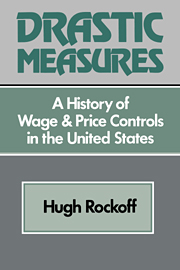Book contents
- Frontmatter
- Contents
- Editors' preface
- Preface
- 1 The debate over controls
- 2 Forgotten experiments
- 3 World War I
- 4 World War II: Attacking inflation directly
- 5 World War II: The market under controls
- 6 The Korean War
- 7 The Vietnam War
- 8 Lessons for the recent crisis
- Notes
- Bibliography
- Name index
- Subject index
- Frontmatter
- Contents
- Editors' preface
- Preface
- 1 The debate over controls
- 2 Forgotten experiments
- 3 World War I
- 4 World War II: Attacking inflation directly
- 5 World War II: The market under controls
- 6 The Korean War
- 7 The Vietnam War
- 8 Lessons for the recent crisis
- Notes
- Bibliography
- Name index
- Subject index
Summary
This book began with a conversation I had some years ago with the distinguished social psychologist Solomon Asch. His classic experiments on the response of individuals to group pressure flowed directly, or so I interpreted his remarks, from his attempt to resolve a crucial debate within his discipline. Economic historians, it seemed to me, also worked with experimental data, although in our case the data came from “natural experiments” — episodes of rapid and extensive change that threw the operation of economic principles into sharp relief. But too often we concentrated on minor problems suggested by fashion or the availability of data. The right thing to do, it seemed to me, was to follow Solomon Asch's example and search for the natural experiments that were relevant to the crucial issues. This line of thought led me to the decision to explore the effects of wartime price controls. For within the discussion of macroeconomic policy, the main alternative to current reliance on monetary and fiscal policy appears to be some form of controls. The judgment shared by many economists, moreover, that controls would always do more harm than good, derives in part from the proposition, properly qualified, which still lies at the heart of modern economics: Unfettered competition will produce maximum economic efficiency. Clearly, the wartime experiences provide evidence on a crucial debate.
The judgment that controls will always fail also derives from the erroneous belief that economic historians have exhaustively examined past experiments with controls and pronounced them a universal failure.
- Type
- Chapter
- Information
- Drastic MeasuresA History of Wage and Price Controls in the United States, pp. ix - xiiPublisher: Cambridge University PressPrint publication year: 1984

